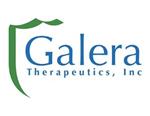Galera Therapeutics, Inc. (Nasdaq: GRTX), a clinical-stage biopharmaceutical company focused on developing and commercializing a pipeline of novel, proprietary therapeutics that have the potential to transform radiotherapy in cancer, today announced a retrospective analysis of Phase 2b trial data demonstrating the potential renal protective activity of lead candidate avasopasem manganese (GC4419),
MALVERN, Pa., May 13, 2020 (GLOBE NEWSWIRE) -- Galera Therapeutics, LLC (Nasdaq: GRTX), a clinical-stage biopharmaceutical company focused on developing and commercializing a pipeline of novel, proprietary therapeutics that have the potential to transform radiotherapy in cancer, today announced a retrospective analysis of Phase 2b trial data demonstrating the potential renal protective activity of lead candidate avasopasem manganese (GC4419), and two ongoing clinical trials evaluating avasopasem, will be presented at the American Society of Clinical Oncology (ASCO) 2020 Virtual Scientific Program, taking place May 29-31, 2020. Abstracts are available now in the ASCO digital program, and presentations will be available for on-demand viewing on May 29, 2020, at 8 a.m. EDT.
“We look forward to sharing important clinical updates that underscore the potential of avasopasem to address radiation-induced toxicities and enhance the anti-cancer efficacy of chemoradiotherapy,” said Mel Sorensen, M.D., President and CEO of Galera. “We’re particularly excited to share, for the first time, new data supporting avasopasem’s potential to improve chronic kidney disease markers in patients treated with cisplatin, a commonly used chemotherapy for cancer treatment. These data came from patients with head and neck cancer enrolled in our completed Phase 2b trial for the reduction of radiation-induced severe oral mucositis (SOM). In head and neck cancer treatment, where cisplatin is a mainstay, avasopasem may have the ability to prevent or mitigate two devastating toxicities of chemoradiotherapy – radiation-induced SOM and cisplatin-induced kidney damage.”
For the retrospective analysis (abstract 12071), pre- and post-treatment markers of kidney function were evaluated for a subset of patients from Galera’s completed Phase 2b trial of avasopasem for the reduction of radiation-induced SOM in patients with locally advanced head and neck cancer. Patients in the trial received seven weeks of radiation therapy plus cisplatin, and were treated with either 30 mg or 90 mg of avasopasem or placebo. Kidney function markers indicate that treatment with the higher dose 90 mg avasopasem significantly reduced the incidence and severity of cisplatin-induced chronic kidney disease compared to placebo.
“Chronic kidney disease is an underrecognized long-term complication of platinum-based chemotherapy occurring in up to 36 percent of patients with cancer receiving it and there is no medication to prevent or minimize it,” said Diana Zepeda-Orozco, M.D., Nephrologist, Nationwide Children’s Hospital. “These data indicate a promising dose-dependent protective effect of avasopasem that results in reduced incidence and severity of chronic kidney disease after chemotherapy, and further study is warranted.”
In addition to the chronic kidney disease data, two additional trial-in-progress (TIP) posters were selected for presentation during the virtual program. The abstracts describe the ongoing Phase 3 ROMAN clinical trial of avasopasem for the reduction of radiation-induced SOM in patients with locally advanced head and neck cancer receiving radiotherapy plus cisplatin (abstract TPS6596), and the ongoing pilot Phase 1b/2a safety and anti-cancer efficacy clinical trial of avasopasem in combination with stereotactic body radiation therapy (SBRT) in patients with locally advanced pancreatic cancer (abstract TPS4670). Galera expects to present topline data from the pancreatic cancer trial in the second half of 2020, and from the ROMAN head and neck cancer trial in the second half of 2021.
About Avasopasem Manganese (GC4419)
Galera’s lead product candidate, avasopasem manganese (GC4419), is an investigational, highly selective small molecule superoxide dismutase (SOD) mimetic that is initially being developed for the reduction of radiation-induced severe oral mucositis (SOM). Avasopasem manganese is designed to rapidly and selectively convert superoxide to hydrogen peroxide and oxygen, protecting normal tissue from damage associated with radiation therapy. Left untreated, elevated superoxide can damage noncancerous tissues and lead to debilitating side effects, including oral mucositis (OM), which can limit the anti-tumor efficacy of radiation therapy.
Avasopasem manganese is currently being studied in the ROMAN trial, a randomized, double-blind, placebo-controlled Phase 3 trial of approximately 450 patients (NCT03689712 available at clinicaltrials.gov) to investigate the effects of avasopasem manganese on radiation-induced OM in patients with head and neck cancer. In Galera’s 223-patient, double-blind, randomized, placebo-controlled Phase 2b trial in patients with locally advanced head and neck cancer receiving concurrent radiation therapy, avasopasem manganese produced a statistically significant reduction in duration of severe oral mucositis (SOM) from 19 days to 1.5 days (92 percent) in the 90 mg treatment arm. Avasopasem manganese also demonstrated clinically meaningful reductions in SOM incidence through completion of radiation by 34 percent and in the severity of OM (incidence of Grade 4 OM) by 47 percent in the 90 mg treatment arm. No significant safety signals were observed, demonstrating avasopasem manganese was well tolerated when added to a standard radiotherapy regimen. The two-year tumor outcomes follow-up of patients enrolled in the trial were consistent with expectations for intensity-modulated radiation therapy (IMRT)/cisplatin alone suggesting that radiation efficacy was maintained.
Avasopasem manganese is also currently being studied in a Phase 2a trial for its potential to reduce the incidence of radiation-induced esophagitis in patients with lung cancer (NCT04225026 available at clinicaltrials.gov), as well as in a pilot Phase 1/2 trial (NCT03340974 available at clinicaltrials.gov) in combination with stereotactic body radiation therapy (SBRT) in patients with locally advanced pancreatic cancer.
The U.S. Food and Drug Administration granted Fast Track and Breakthrough Therapy designations to avasopasem manganese for the reduction of SOM induced by radiotherapy.
About Galera Therapeutics
Galera Therapeutics, Inc. is a clinical-stage biopharmaceutical company focused on developing and commercializing a pipeline of novel, proprietary therapeutics that have the potential to transform radiotherapy in cancer. Galera’s lead product candidate is avasopasem manganese (GC4419), a highly selective small molecule superoxide dismutase (SOD) mimetic initially being developed for the reduction of radiation-induced severe oral mucositis (SOM). Avasopasem manganese is being studied in the Phase 3 ROMAN trial for its ability to reduce the incidence and severity of SOM induced by radiotherapy in patients with locally advanced head and neck cancer, its lead indication, and in the Phase 2a trial for its ability to reduce the incidence of esophagitis induced by radiotherapy in patients with lung cancer. The FDA granted Fast Track and Breakthrough Therapy designations to avasopasem manganese for the reduction of SOM induced by radiotherapy. Galera is developing a second product candidate, GC4711, which successfully completed Phase 1 trials in healthy volunteers. Galera is headquartered in Malvern, PA. For more information, please visit www.galeratx.com.
Forward-Looking Statements
This press release contains forward-looking statements within the meaning of the Private Securities Litigation Reform Act of 1995. All statements contained in this press release that do not relate to matters of historical fact should be considered forward-looking statements, including without limitation statements regarding our beliefs about clinical data, upcoming events and presentations, the potential, efficacy, and regulatory and clinical development of Galera’s product candidates, and plans and timing for the commencement of and the release of data from Galera’s clinical trials. These forward-looking statements are based on management’s current expectations. These statements are neither promises nor guarantees, but involve known and unknown risks, uncertainties and other important factors that may cause Galera’s actual results, performance or achievements to be materially different from any future results, performance or achievements expressed or implied by the forward-looking statements, including, but not limited to, the following: Galera’s limited operating history; anticipating continued losses for the foreseeable future; needing substantial funding and the ability to raise capital; Galera’s dependence on avasopasem manganese (GC4419); uncertainties inherent in the conduct of clinical trials; difficulties or delays enrolling patients in clinical trials; the FDA’s acceptance of data from clinical trials outside the United States; undesirable side effects from Galera’s product candidates; risks relating to the regulatory approval process; failure to capitalize on more profitable product candidates or indications; ability to receive Breakthrough Therapy Designation or Fast Track Designation for product candidates; failure to obtain regulatory approval of product candidates in the United States or other jurisdictions; ongoing regulatory obligations and continued regulatory review; risks related to commercialization; risks related to competition; ability to retain key employees and manage growth; risks related to intellectual property; inability to maintain collaborations or the failure of these collaborations; Galera’s reliance on third parties; the possibility of system failures or security breaches; liability related to the privacy of health information obtained from clinical trials and product liability lawsuits; unfavorable pricing regulations, third-party reimbursement practices or healthcare reform initiatives; environmental, health and safety laws and regulations; the impact of the COVID-19 pandemic on Galera’s business and operations, including preclinical studies and clinical trials, and general economic conditions; risks related to ownership of Galera’s common stock; and significant costs as a result of operating as a public company. These and other important factors discussed under the caption “Risk Factors” in Galera’s Quarterly Report on Form 10-Q for the quarterly period ended March 31, 2020 filed with the U.S. Securities and Exchange Commission (SEC), Annual Report on Form 10-K for the year ended December 31, 2019 and Galera’s other filings with the SEC could cause actual results to differ materially from those indicated by the forward-looking statements made in this press release. Any forward-looking statements speak only as of the date of this press release and are based on information available to Galera as of the date of this release, and Galera assumes no obligation to, and does not intend to, update any forward-looking statements, whether as a result of new information, future events or otherwise.
Investor Contacts:
Christopher Degnan
Galera Therapeutics, Inc.
610-725-1500
cdegnan@galeratx.com
Chiara Russo
Solebury Trout
617-221-9197
crusso@soleburytrout.com
Media Contact:
Heather Anderson
6 Degrees
919-827-5539
handerson@6degreespr.com





